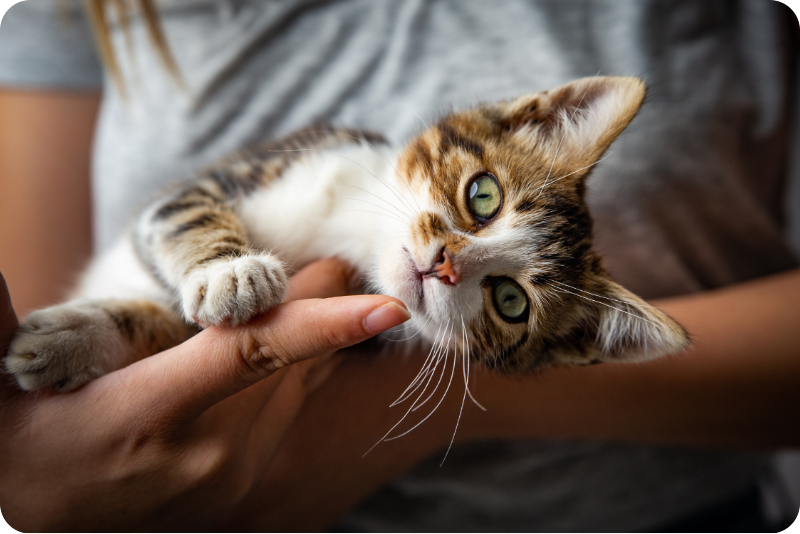As our feline companions grow older, their needs change in subtle – and some not-so-subtle ways. Whether your cat has just entered their senior years or is already a seasoned snoozer, a few small adjustments to their routine can make a big difference to their comfort and wellbeing.
Cats are renowned for their independence, but our feline golden oldies may need a little more help as they age. That’s why we’ve put together these senior cat care tips to help you keep your feline friend happy and healthy in their later years.
Quick Links
Know when your cat becomes ‘senior’
Did you know cats are generally considered “senior” from around 10 years old? However, age-related changes often begin earlier and can appear as young as seven in some cats, so it’s helpful to be mindful of their needs even before they officially reach senior status.
Being aware of your cat’s stage of life allows you to tailor their care more effectively. Whether it’s switching up their diet, adjusting their environment, or booking more regular vet checks, recognising the signs of ageing is the first step in supporting them.
Book regular vet check-ups
Senior cats are more likely to experience health conditions such as kidney disease, arthritis, thyroid imbalances and dental issues. The tricky part? Cats are experts at hiding discomfort, which means these issues can go unnoticed without a thorough check-up.
Signs to look out for:
- Drinking and urinating more
- Weight loss
- Matted fur
- Increased sleeping
- Reluctance to jump
That’s why one of our most important pieces of advice on senior cat care is to book regular vet visits. We recommend a full health check every 6 to 12 months for older cats. As well as giving your cat a full ‘MOT’, your Kin Vet team may advise blood pressure checks, blood tests or urine analysis to help spot any problems early and give your senior cat the best chance of staying healthy and happy for longer.
Tailor their diet to their age
As cats age, their metabolism, appetite, and nutritional needs change. Some might become fussier or take less interest in their food. Others may gain weight because they’re less active than they used to be.
Switching to a senior cat food can help address these changes. Senior formulas often contain fewer calories, include nutrients to support joint health, and ingredients that are easier to digest. Make sure to check in with your vet before making any dietary changes; they can help advise you on the most appropriate food for your cat’s individual needs.
Monitor weight and mobility
A healthy weight plays a key role in your cat’s comfort and overall wellbeing. Weight loss could point to conditions like hyperthyroidism or diabetes, while weight gain can worsen mobility problems like arthritis.
If your cat seems reluctant or hesitant about jumping, has stopped accessing their favourite higher up perches, or is sleeping more than usual, it might be time to have their joints assessed. More than 80% of cats over the age of 10 will have arthritis detectable by x-rays1.
There are a variety of ways to support felines with joint health, and your vet can guide you on weight management, pain relief and ways to keep your cat as active and mobile as possible. Keeping track of subtle changes is one of the best senior cat care tips you can follow.
Create a comfortable environment
Senior cats may sleep more and move less, which makes their environment even more important. Offering soft bedding in quiet draught-free areas gives them a safe and cosy place to rest up.
If your cat is struggling to reach their favourite spots, like a windowsill or sofa, consider providing pet steps or ramps. Litter trays with low sides are easier for stiff joints to manage, and heated beds or pads can soothe aching muscles, especially in winter. Small changes like these can go a long way to support your cat’s comfort and happiness as they age.
Watch for changes in behaviour
Your cat might show subtle shifts in behaviour that can be easy to overlook. Changes in sleep patterns, increased vocalisation, confusion or even house soiling could all be signs of illness, cognitive decline or sensory loss.
One of our most valuable senior cat care tips is not to dismiss these changes as “just old age”. If you notice anything out of the ordinary, it’s worth speaking to your vet. The sooner we can identify any underlying issues, the better the outcomes for your cat’s health.
Stay on top of grooming and dental health
Older cats may not groom as efficiently, leading to matted fur, greasy coats, or dandruff. Regular brushing not only helps them look and feel better but also allows you to check for any unusual lumps, bumps or sore spots.
Dental disease is another common problem in older cats and can cause pain, reduced appetite and infections. At Kin Vet, we recommend regular dental check-ups as part of your senior cat’s ongoing care plan. Some cats may benefit from tooth brushing or special dental diets too.
Helping your cat age comfortably doesn’t require big changes, just a little extra awareness, a few simple home adjustments, and regular support from your vet. By following this advice on senior cat care, you can give your cat the best quality of life in their older years.
If you have any concerns about your cat’s health or wellbeing, or would like to book a senior health check, find your local veterinary here.
References:
- Arthritis – Cats Protection Veterinary Guide 1 (n.d.)
Find a Vet Practice Near You
Our Latest News and Advice

Join our Pet Healthcare Plan, the Kin Care Club.
Our comprehensive pet healthcare plan is designed to help you give your cat or dog the best care, while keeping your budget in mind.
Whether you’re looking for essential coverage or complete peace of mind, the Kin Care Club offers two flexible plans tailored to your needs and your pet’s well-being.




